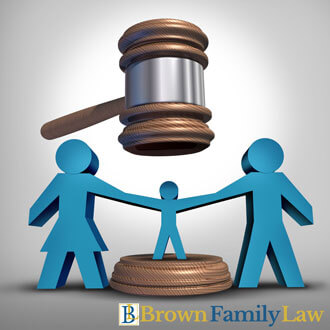Who is More Likely to Win a Custody Battle?
Courts award legal or physical custody to the parent who can provide a safe and secure living environment for the minor child. Taking the best interest of the child into account, the court considers the following factors before awarding custody to one of the parent (sole custody), or joint or split custody to both the parents:

- Financial resources and ability of the primary custodial parent to care for the child
- Parent’s moral character and moral compatibility with the child
- Parent–child relationship
- Parent health
- Domestic environment
- Ability to facilitate a healthy relationship between the child and the other parent
- Any other reason that the court may deem fit
The difference between legal custody and physical custody is that in legal custody the court rules which parent gets to decide about important issues related to the child, while in physical custody the court rules where the child will live. The court can award sole or joint or split custody based on the following “best interest” factors:
Financial Resources and Ability of the Primary Custodial Parent to Care for the Child
A primary custodial parent is a parent who is awarded the sole or primary physical custody of a child. She/he is the parent with whom the child spends most of his/her time.
To decide whether a parent has the financial resources and the ability to qualify as a primary custodial parent, the court considers the following factors:
- Can the parent comfortably provide for the child’s essential daily needs, such as food, clothing, schooling, medical care, etc.?
- Can the parent ensure that the child attends school, keeps his medical appointments, and can participate in his extracurricular activities?
- Does the parent help the child with homework or school projects?
- Does the parent ensure that the child maintains hygiene?
- Will/Can the parent facilitate visitation between the child and the other parent?
- Can the parent provide a suitable home for herself/himself and the child?
- Can the parent provide the child with a healthy, clean, safe, stable, and motivating environment?
- What kind of a job is the parent employed in?
- Does the parent have bad habits such as excessive drinking or smoking, keeping late hours, not maintaining hygiene, resorting to violent behavior, etc.?
The court also takes into account whether the parent who wants primary custody is in a stay-at-home job and can contribute to the child’s mental growth by being in the child’s proximity most of the time.
Parent’s moral character and moral compatibility with the child
- Has the parent committed any criminal acts in the past, including being convicted of a DUI charge?
- Has the parent been found guilty of lewdness/obscene behavior?
- Does the parent have close connections with a sex offender?
The court goes deep into the moral fiber of each parent to determine whether her/his behavior can adversely impact the child’s development.
Parent–Child Relationship
- How strong is the emotional bond between the parent and the child?
- Which parent does the child turn to whenever he encounters a problem?
- Does the child wish to be with any one particular parent, and why?
- If religion has played a role in the upbringing of the child, then which parent is best suited to guide the child based on the religious principles on which he has been raised?
- How does the child relate to his home, neighborhood, and school environment? Will the child be unhappy after moving to another neighborhood and school?
Parent Health
- Is the parent mentally and physically healthy enough to provide for the child’s physical requirements, emotional needs, and healthcare?
Domestic Environment
- Was the child neglected by any parent?
- Was the child subjected to violence or domestic/sexual abuse by any parent?
- Are the parents hostile towards each other, and do they fight with each other often?
- Whether any parent has leveled false accusations against the other?
- Will the child benefit if he is not separated from her/his sibling/s?
- Has any parent walked out of the home, abandoning the child?
Ability to Facilitate a Healthy Relationship between the Child and the Other Parent
Both before and after divorce, parents are expected to facilitate a wholesome and continuing relationship between the child and the other parent. The court reviews the willingness of each parent to facilitate such a relationship because it presumes that each parent has the right to meet and interact with the child according to the schedule and location set by it.
Any Other Reason that the Court May Deem Fit
Every child custody case is unique and the courts can discover a different set of situations that need to be probed before awarding custody.
Before signing off, here are a few more factors to consider:
- Many parents believe that the mother is automatically the one who gets custody. This is not true. The court considers the best interest of the child before awarding legal or physical custody.
- In certain situations where both parents are found to be unfit, the state can take custody from the parents and place the children with family members, like grandparents, or even with non-related foster parents.
- Over 90% of child custody cases are settled without a court’s ruling.
- In some cases, the court appoints a child custody evaluator to determine which parent can provide a more stable and secure environment to the child.
After considering the best interest factors above, the court decides on legal and physical custody, primary custody, and visitation rights.
